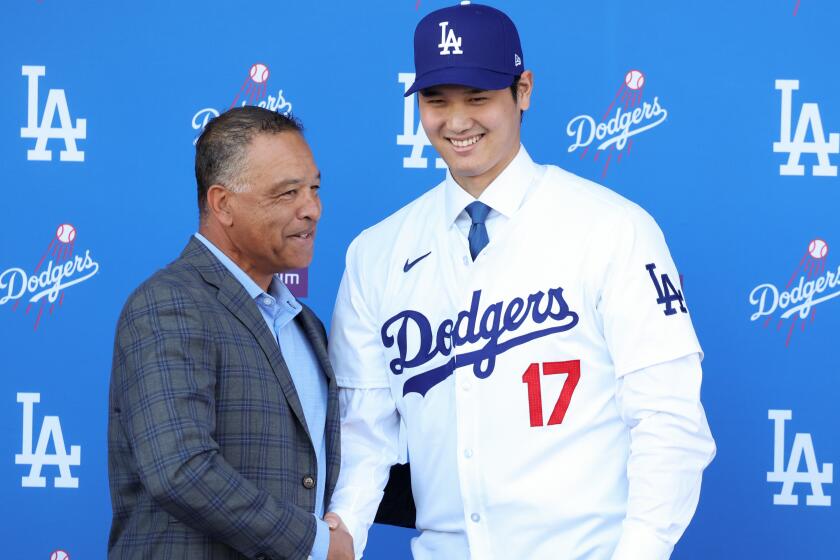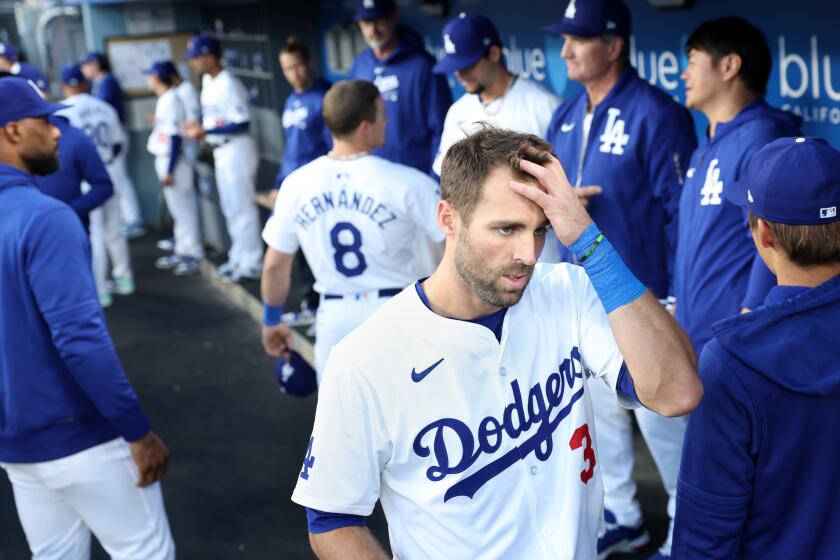Owner’s Vision Plan Comes With Blue-Colored Glasses
Behind him, a large, round window that expands his smallish office to the purplish peaks of the San Gabriel Mountains. To his left, Dodger Stadium, dabbed with blues, yellows and greens, seven weeks from its third opening day under his ownership.
Ahead? Hard to tell.
Frank McCourt has the props.
He recently purchased a letter written by Jackie Robinson during his tumultuous early seasons in the major leagues, and he clearly treasures it.
On a bookshelf, an orange Wheaties box depicts the last glorious moment in Dodger history. It is signed by Kirk Gibson himself.
A photo of the scoreboard at Fenway Park leans nearby, the panels turned to announce the Dodgers before an interleague game.
After two years, McCourt and the Dodgers are again in transition, from DePodesta to Colletti, from Tracy to Little, from first place to fourth to whatever 2006 holds.
On a recent Friday afternoon, McCourt talked about some of the issues of his first seasons in Los Angeles, and where it goes from here.
Q: How are the Dodgers better off than they were two years ago under Fox?
A: Well, without any comparisons, which I’m reluctant to make regarding other ownership, I can comment on how I think [the Dodgers] are better off two years into my stewardship. First of all, I’m an owner with two years of experience. When you buy a baseball franchise, it doesn’t come with an owner’s manual. You’ve got to be an owner of a baseball team to understand what it means to be an owner of a baseball team, and to fully internalize the notion that you’re really not an owner, you’re a steward. Sure, you own the asset, but it’s a civic asset. It’s a public trust. The other point is, it takes time to get your arms around an organization, to get your priorities right and to embed the values you want in an organization.
The great thing about the Dodgers, of course, is we get to do that building on a great tradition, a great history.
Q: Tangibly, how are they better?
A: Vision is one thing. Setting the goals that I’ve set for, No. 1, championship baseball; No. 2, the best fan experience; and No. 3, a deeper and richer relationship between the Dodgers and the community. Those goals and that vision is one thing. But you need to have senior management in place to turn that vision into a plan and implement that plan. I feel now we have a great senior management team in place here. With that, they will realize those goals.
Q: Do you believe that what you’re doing here is properly aligned with the perception of what you’re doing here?
A: Probably not. But time and consistency will solve all that. Our mantra in business is, “High road, long view.” I think that what I’ve learned living in the fish bowl for the last couple of years is that people draw conclusions very quickly, impressions can be created very quickly. I’m not someone who’s lived my life thinking about [public relations] first. I’ve tried to focus on what it is I want to do, and what I want to do, with whom I’m going to do that. So, there may be some misalignment in terms of reality and impression, but it will all come into focus over time.
I think it’s getting more into focus now, for instance, than perhaps it was a year or 18 months ago.
Q: The passage of time will allow your vision, your work ethic, your goals, your financial capabilities to align with public perception?
A: I think the passage of time will do that, if you’re true to your goals and true to your vision and you work hard at it every day. That’s not to say we shouldn’t do a better job aligning perception and reality, because you’ve got short time frames. I guess what I’m trying to say in a nice way, substance, to me, will always trump sizzle.
Q: The McCourts and the Dodgers: Which is the brand and which is the product?
A: It’s all about the Dodgers, period. End of sentence.
Q: There are employees who seem to be confused. They have suggested that, according to the McCourt family, the McCourts are the brand and the Dodgers are the product, and to think in terms of that. Is that inaccurate?
A: Totally, 100% inaccurate. I’ve learned there are a lot of people who say a lot of things. That’s life owning a big league baseball team, not to mention the Dodgers in Los Angeles.
Q: The employee turnover within the organization. Why do so many people leave, whether of their own volition or otherwise?
A: First, in a polite way, I don’t accept the premise.
Q: You don’t think there’s been an unusual amount of turnover in two years from your top management to the lower levels?
A: No, not unusual. Not when you’re trying to achieve what we’re trying to achieve, and dealing with a fairly mature enterprise. We’re sort of changing the vector a little bit. When I say “mature,” what I mean is things have been done a certain way for a period of time. There’s no question the rpm level was increased maybe a little bit. We’ve set out the goals that I repeat over and over again, about championship baseball, our fan experience and our relationship with the community. Again, with all due respect to the tradition and the history, which is like no other franchise as far as I’m concerned, I do feel that we can and should be doing more and achieving greater heights. In that process, there’s going to be some natural turnover. If you were to look at any enterprise where things are moving in a little different direction and there’s new ownership, new goals being set out, it’s totally natural. Probably the biggest change was the one I made this off-season, with the general manager. I hired a general manager when I first arrived here, Paul [DePodesta], and felt that change needed to be made. We brought in Ned Colletti, and I hope you agree it’s proven to be a good decision. Changes create anxiety. It’s not until you have the new person in place, or the new team in place, that people step back and see that the change was good.
Q: That five- or six-week period at the end of the regular season -- Jim Tracy is fired, manager search, DePodesta is fired, general manager search, manager search -- even for someone who talks about the evolution of bringing in people who understand your vision and rpm level, was that trying?
A: It was intense, that’s for sure. But it’s in those moments in an organization that real progress can be made. And I think we made real progress in the last couple of months, and particularly in that period you referred to. I think we have great baseball people in place now that, most importantly, will all be working in concert. Everybody on the baseball side will be working together, pulling in the same direction, with one goal in mind. And that’s a world championship.
Q: To get to that place, it was a two-year process. What specifically have you learned, without an owner’s manual, that will serve you going forward?
A: When you have the privilege of buying a team, intellectually you know that you love the game. I was a big fan, and intellectually you know the fans love the team, and you know how much you want to win. It’s not until you actually own the team and you’re fully immersed that it all truly manifests itself. You need to be 100% committed, as I am, to our goal of winning, and our goals of giving our fans the best experience and doing the most we can in the community. You realize it’s 24/7. You don’t just know of the fans’ passion, you feel it. You don’t just know of your love or passion for the game, you need to be patient. You need to live it. This is all done, of course, within a fishbowl, so there’s a public aspect to it that’s different. It takes some time adjusting to it, particularly when you’ve lived a relatively private life. So, it’s a process. It’s a learning process, a growing process and an adjusting process. But I feel now, in large measure because of the challenges of the past season, that I’ve owned the team for 10 years. That’s a good thing. I can’t tell you how excited I am about what the future holds and how excited I am to get the season started.
Q: At any point after the difficult moments have you looked back and thought you were as much a part of the problem as the solution?
A: First of all, let me just state up front, you learn. You have to learn. And you have to learn quickly. I’ve made my share of mistakes during the first couple of years. But I think it’s important that I take responsibility, like I ask everybody else here to, and hold myself accountable. I want everybody here to be accountable. None of us are perfect. It’s how you deal with those mistakes that is telling. For purposes of illustration, the decision I made to hire Paul as the general manager, deciding that wasn’t the right direction, and hiring Ned. What I’ve learned is that the number of decisions that the owner should be making are really relatively few, but that those decisions are critical to the success of the enterprise. I think that having a general manager who I’m on the same wavelength with, who in turn gets a staff in place, manager included, that are on the same wavelength as well, so that we’re all resonating together. You know the expression, “One heartbeat”? That’s what we’re aspiring to. I think things are on a much better track now because of that.
Q: Do you feel the encroachment of the Angels? How might their emergence affect the Dodgers short- and long term?
A: All we have to do is focus on our goals and our objectives and deliver. The Dodgers are unique. They’re unique in all sports. They’re singular in baseball, as far as what they stand for. They’re Los Angeles’ team. All we have to do is focus on restoring the glory of this great franchise and that should be our sole motivation. That should occupy all of our time. And I’m not going to allow anybody here to be distracted by things that I view as distractions.
Q: Your involvement in the NFL. Where does that stand?
A: Same place that it’s stood from the get-go. I made it clear to everyone from elected officials to community leaders to opinion leaders and the NFL itself that we support football in L.A., we support it in the Coliseum and that the Dodger Stadium site is not an option so long as the Coliseum is viable.
More to Read
Are you a true-blue fan?
Get our Dodgers Dugout newsletter for insights, news and much more.
You may occasionally receive promotional content from the Los Angeles Times.






